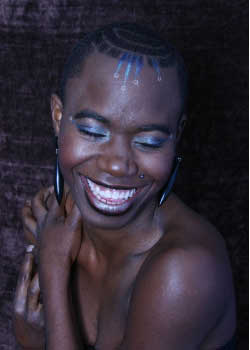
An Interview with D''bi Young - Part l
“It’s unfortunate that in Western society, this sort of liberal individualism has encouraged people to sort of streamline themselves and put themselves into a box so that people are impressed when you can write and act and dance. But where we’re coming from as African people, we know that story telling is a very complicated affair. It necessarily means that you have to be a multi-tasker as you intend on getting the attention of the people. So I don’t feel very special in what I’m doing. I’m doing what my people do.”
- D’bi Young
If the saying that lightning never strikes twice in the same place is true, then Toronto’s Lula Lounge was a hub of miracles a few months back. The sparks and electricity generated when two generations of Jamaican dub poets, the pioneering Anita Stewart and her daughter D’bi Young, came together could have been used during Toronto’s infamous blackout a few years back. The event was D’bi Young’s book launch for her book Art on Black last March at the Lula Lounge.
As they performed their dub piece together, it was evident that the oft-recurring themes of continuity of heritage, rebirth of cycles, and remembrance of herstory, found in D’bi’s work and speech, also found a home on stage. If fact, it was a truly poetic twist of fate that both mother and daughter are new mothers at the same time. “Performing with her was really humbling. I remember standing on stage and just feeling like I was five and feeling like I was twenty-eight. It was really an incredible feeling,” Young says.
AfroToronto.com recently caught up with D’bi Young at her home to reflect on this powerful moment and to peer into this multi-faceted artist’s latest and upcoming projects. Confirming what the entire audience could feel on that book launch day, D’bi Young isn’t shy to express her feelings about her mother: “Let me tell you something, I’m in love with my mother. I am absolutely in love, enthralled with my mother. And it’s been like that as long as I can remember.” Although she also recognizes that there have been the usual mother-daughter arguments and “huge leaps and bounds in terms of separating and coming back together,” their bond is a precious one.
Anita Stewart was one of the first dub poets in Jamaica. Therefore, D’bi Young’s worldview and experience, both as a dub poet in her own right and as a human being, have been greatly shaped by her mother. As she explains: “Growing up, my sort of social conditioning was all about dub poetry, all about being political, looking at Marx and looking at working-class issues.” D’bi Young’s image of Black womanhood has its genesis in her mother’s experience as a sixteen-year-old mother “juggling an acting career, juggling a political career, juggling a career as a teacher, a whole bunch of complications and all the while being working class.” Young’s experience of growing up dirt poor among the underclass in the shadows of Jamaica’s Trenchtown ghetto, and the powerful matriarchal examples of her mother and grandmother, make up the very fabric of her dub poetry.
I must say that until I attended Art on Black’s book launch, I had been much more familiar with D’bi Young’s actor side. I was happily surprised to also discover a gifted singer and band performer. There was a definite rock edge to her dub poetry. While I had heard her perform Animal Farm before, hearing it rendered in song and accompanied by a rock band was an entirely new experience. “Yes, I want to be a rock star when I grow up,” D’bi jokingly quips. But she informs me that from the 1970s, the people who were experimenting with the art form of dub poetry necessarily played with live musicians. Those pioneers were part of a multi-disciplinarian school of thought. As she explains: “Actually, my background is a combination of theatre and dub poetry. So playing in a band is not new. It’s not new in terms of the art form that I’m doing. Dub comes out of live music. … Dub is music. So, what I’m doing is very consistent with my form. In fact, it’s my first place of storytelling. … Dub is my first thing. Acting came afterwards. … So what you saw at the launch is closer to where I’m located, or where I ground myself, than theatre is.”
Grounding herself again in the cyclical yet evolving tradition of her heritage, D’bi Young takes as an example the fact that the dub poetry pioneers were wide-ranging in artistic scope. “They had music, they had visual art, they had acting, directing, playwriting. … They had all the musicians working for them even though they were working-class people who were interested in working-class issues.” Hence, D’bi Young doesn’t see anything unusual about theatre, playwriting, poetry and all those things existing in the same space. “I feel like a storyteller necessarily has the potential to choose to do a more multi-disciplinary,” she adds.





Comments powered by CComment